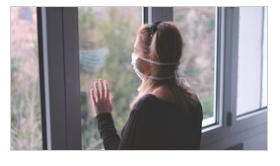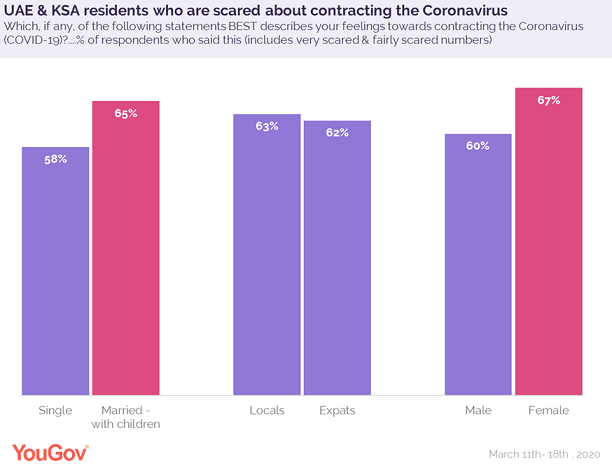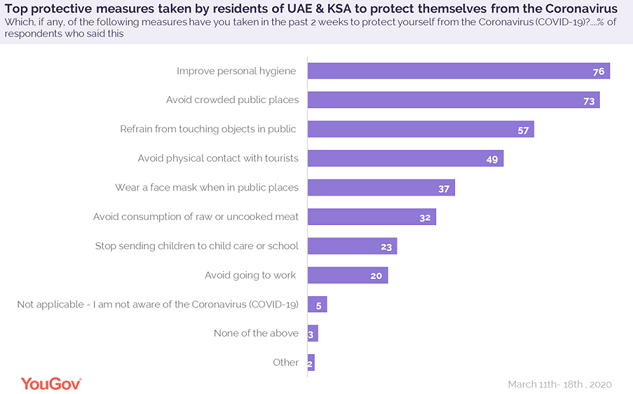 YouGov’s ongoing tracker reveals how residents are reacting to the rising number of Coronavirus cases
YouGov’s ongoing tracker reveals how residents are reacting to the rising number of Coronavirus cases
As new cases of the Coronavirus emerge in the UAE and Saudi Arabia, YouGov’s ongoing tracker captures public sentiment around COVID-19 and shows how residents in the two countries are reacting to the rising number of infections.
The latest data reveals that 62% respondents in both the countries who were surveyed between 11th- 18th March said they are ‘very scared’ or ‘fairly scared’ about contracting the Coronavirus. 30% on the other hand are not very or not at all scared.
Although older people are believed to be the most vulnerable to this pandemic, a third of respondents in UAE and KSA aged 45+ years (34%) said they are either not very scared or not at all scared about getting infected.
Among the genders, a higher number of women than men in the two countries are fearful of acquiring the virus (67% vs 60%). Likewise, married residents with children are more worried than the single respondents (65% vs 58%).
Both locals and expats seem to be fearing the pandemic. In the UAE, Arab expats seem to be the most panic-stricken, with 69% of them saying they are very scared or fairly scared about contracting the virus. Emiratis are equally scared – at 67%. Fear among Asian and western expats is lower- at 61% each.

In KSA, expats are more afraid about getting the infection as compared to locals (68% expats vs 62% Saudis).
The widespread level of fear explains the vast majority of people taking some kind of safety precautions to protect themselves. The most common precaution has been to improve personal hygiene, such as washing hands more frequently or using sanitiser, which three-quarter residents (76%) are doing.
Almost as many (73%) avoid crowded places. Roughly half the respondents refrain from touching objects in public (57%) and avoid physical contact with tourists (49%).
Many wear a face mask in public (37%) and are avoiding consumption of raw or uncooked meat (32%). One in five have stopped going to work (20%).
Given the massive media coverage on the issue, it is not surprising to see that the vast majority (95%) of UAE and KSA residents are aware of the outbreak and have heard of either ‘Coronavirus’, ‘Wuhan virus’ or ‘COVID-19’.

Most (70%) feel well-informed about what to do if they suspect they have coronavirus. UAE residents tend to be more knowledgeable about handling this situation than KSA residents (74% vs 67%). But 18% of all respondents do not have enough information, with young adults being especially likely to feel this way (24% of 18-24 years old respondents).
Witnessing the wide scale frenzy around the outbreak, a quarter of respondents have stockpiled supplies in their house, although a majority (68%) haven’t done it yet.
Many people have modified their travel plans to avoid any risk of getting infected. 36% have already cancelled plans to travel overseas due to COVID-19, and 21% are delaying booking future travel. One in five (19%) are more cautious and are thinking of cancelling all future travel plans.
There are few (6%) who seem unperturbed and are planning to go ahead with their arranged overseas trips, while few others (4%) are actively looking to travel overseas or have already booked an overseas trip.
In the weeks to come, YouGov will continue to track the public’s attitudes and opinions on Coronavirus across the globe.
Data collected online by YouGov Omnibus among 2007 respondents in the UAE and Saudi Arabia between 11th and 18th March 2020 using YouGov’s panel of over 6 million people worldwide. Data is representative of the adult online population in each country.


